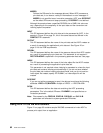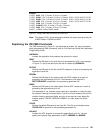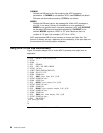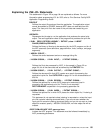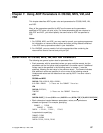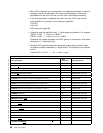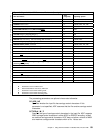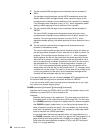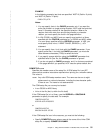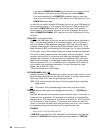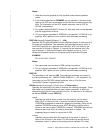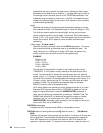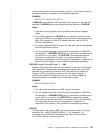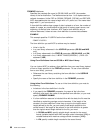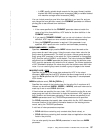
Z The file contains ANSI carriage-control characters that are encoded in
ASCII.
The carriage-control characters are the ASCII hexadecimal values that
directly relate to ANSI carriage-controls, which cause the action of the
carriage-control character to occur
before
the line is printed. For example,
if the carriage-control character is zero (X'30'), which represents double
spacing, double spacing will occur
before
the line is printed.
A The file contains ANSI carriage-control characters that are encoded in
EBCDIC.
The use of ANSI carriage-control characters cause the action of the
carriage-control character to occur
before
the line of data is printed. For
example, if the carriage-control character is a zero (X'F0'), which
represents double spacing, the double spacing will occur
before
the line is
printed.
M The file contains machine code carriage-control characters that are
encoded in hexadecimal format.
The use of machine code carriage-control characters cause the action of
the carriage-control character to occur
after
the line of data is printed. For
example, if the carriage-control character is a X'11', which represents
double spacing, the line will be printed and the double spacing will occur
after
the line is printed. In addition, machine code carriage-control has a
set of carriage-control characters that perform the action, but do not print
the associated line. For example, if the carriage-control character is a
X'13', which also represents double spacing, the print position will be
moved down two lines but the line that contains the X'13' carriage-control
character will not be printed. The next line in the data will be printed at the
current print position and the action for the associated carriage-control
character will be performed
after
the line is printed.
If you specify cc=yes but you do not specify cctype, ACIF assumes that the
file contains ANSI carriage-control characters encoded in EBCDIC.
If you are not sure which type of carriage-control characters are in your input
file, consult your system support group.
CHARS=
fontname1
[,
fontname2
][,
fontname3
][,
fontname4
]
| Specifies the file name (in OS/390, MVS, and VSE, the member name) of the
| coded font you want ACIF to use to process a file.
|
fontname
| Specifies the file name of the coded font. The name does not include the
| 2-character prefix of the coded-font name (X0 through XG). The file name
| for a CHARS parameter is limited to 4 alphanumeric or national characters.
| Use CHARS to specify coded fonts in a font library having names of 6 or
| fewer characters (including the prefix). You can rename any fonts having
| more than 6 characters or use a font utility program to create new coded
| fonts for use with the CHARS parameter.
| In line-mode data, the fonts are specified either in a page definition or in
| the CHARS parameter, but not in both. You cannot mix fonts specified in a
| page definition with fonts specified with CHARS for a single file. Select
| fonts either with table-reference characters (TRCs), with AFP structured
| fields, or in a page definition.
90 ACIF User’s Guide



